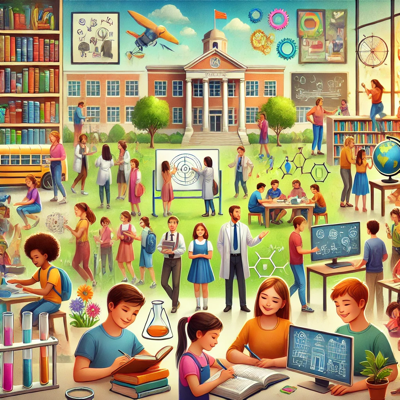Purposes & Goals of Education
Overview
This article serves as a comprehensive resource for educational institutions and educators to provide guidance on determining purposes of education for setting educational goals and outcomes.
To achieve this we review some background on who makes these decisions and then write focus questions. Using the focus questions we review a meta-study of thirteen categorizes of educational purposes to write our purpose to guide the creation of our goals of education.

Background
The purpose of education is for individuals to attain knowledge and skill for their personal growth in physical, social, intellectual, and emotional areas.
Over the years people grapple with who:
- Determines what learners should know and do to determine and achieve their life goals.
- Who selects who gets access to different types of education and hence different types of knowledge.
- Who decides how individuals should progress through a curriculum and what achievement is required for success.
Communities, families, and individuals address these questions primarily for the well-being of each person. And a country or state must decide what type of education is best for each person for the public good, ensuring their survival and well-being.
As these people decide on purposes, and hence goals of education, several focus questions arise.
Focus questions
- Who should be served by the educational system?
- What role should citizens have in the educational process?
- How should education be funded?
- How do we educate our children?
- What does it mean to be educated?
- How do we select who should teach?
- What kinds of knowledge should be included in the curriculum?
This encompasses physical skills, social skills, intellectual abilities, emotional understanding, reasoning, argumentation, decision-making, conflict resolution, literacies, dispositions, habits of mind, civics, and moral and ethical issues.
The responses to these questions shape our perspectives on the purpose of education.
We can use these focus questions as a framework to review our ideas about education and determine our educational purposes. To aid us in this process, we can consider information from a comprehensive meta-analysis of educational documents and the thirteen categories of educational purposes it identified. These categories can serve as a guiding framework for selecting educational purposes for our schools.
They include:
Purposes of education
- Create a meaningful life - enjoyment, power, social, caring/love, survival, personal satisfaction/ fulfillment, worthy use of leisure, foster curiosity and innovation to fulfill peoples' dreams and aspirations.
- Good citizenship - thoughtful, humane, responsible, moral, caring, & ethical.
- Economic welfare - prepare for a vocation, life training, college, productive work force. To be successfully employed to earn a living and be a consumer. Engage in using and creating knowledge as producers in different fields essential and worthy of human pursuit. To maintain a healthy market economy.
- To be spiritual - religious, mysticism, paranormal, supernatural, metaphysical, & existentialism.
- Learn the fundamentals or become literate - to be able to read, write, orate, linguistic, calculate, logical-mathematical, spatial, visual, (cover the standards) (improve tests scores) (achieve AYP), media literate, financial literate.
- Develop physically - body and physical skill development, kinesthetic, physical education, physically healthy, physical skill in art, drama, music, trades, technology.
- Become social - the well being of each individual within society, intra personal, interpersonal, human relationships, social skills, social groups, proper social behavior, conflict management, and social engineering. Agency and purpose to maintain or remake the social order to sustain life on Earth.
- Critical thinker, decision-making, and problem solving - how to inquire, how to think - not what to think, know where to find information, how to analyze it, how to create alternative solutions, how to use it, and how to communicate it.
- Develop into a life long learner - the will, skill, self-efficacy, knowledge of knowing how to learn as an explorer, and desire to be a lifelong learner, habits of mind, dispositions to develop the love of learning, and exercise free will.
- Worker bees - Brain wash to be peaceful obedient drones knowing and obeying the state ideologies.
- To have more citizens, educators or teachers - maintain a social or educational system to prepare more educators or teachers to sustain the good life.
- To create a better way of living - know yourself, intra personal, self-efficacy, sense of well being, healthy life style (nutrition, medical, physical, sex, aids, drug), wealth, wisdom, naturalist, harmony with nature, maintain a sustainable Earth.
- Maintain a caste system - sort, select, filter, and prepare workers. Sustain the belief education provides an egalitarian meritocracy that self selects for higher education, skill-intensive occupations, menial work, or leaders positions within a fair system of equal opportunities for all to rise based on their abilities, hard work, and belief in availability of necessary resources.
Sample Purpose
Purpose statements are used to guide planning, teaching, and learning. Documentation of its implementation is found in the documents created by government bodies, schools, and educators.
Purpose
The purpose of education is to prepare individuals with the knowledge and skills necessary to become active and engaged democratic citizens. This requires collaborative participation in decision-making communities that prioritize mutual care and well-being.
An education that provides learners with the opportunities to learn how to learn, to develop critical thinking, problem-solving, and conflict resolution skills. It emphasizes the importance of inclusivity and fostering an environment where everyone feels valued and accepted. By gaining diverse experiences and knowledge, learners can acquire the necessary literacy and communication abilities to effectively contribute to the sustainability of our planet.
This purpose is used to guide the creation of the perspectus of a school with an integrate curriculum. Check the threading of it to the following in the document.
Information provided on this site serves as a valuable resource to support this educational purpose.
Resource to explore purposes of education throughout history.
American Education timeline - an annotated timeline of people & events about American education
Home for Pedagogy - theory, curriculum, learning, human development, & teaching